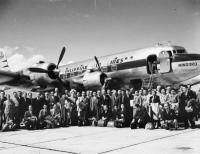At the appropriate moment he would always give those at his gatherings, whatever their faith or lack of it, the deepest Christian truths he knew, often centred round the story of how he had himself been washed clean from his hatreds by his experience of the Cross at Keswick and how Christ had become his nearest friend. This was done with the utmost urgency - that everyone must face the reality of their sin, and find change and forgiveness. But he never added that those in his audience must break with their traditions, or join this or that church. He felt that his task was to bring people into vital touch with the Holy Spirit who would lead them each personally, and, in the process, would help them to live by the will of God. His purpose was to enlist everyone in the moral and spiritual revolution which he held to be vital if the nations were to be remade and become instruments in the hands of God for the benefit of one another. In this he was a pioneer of what was to become an increasingly held open and inclusive position towards those of other faiths.
Thus in two speeches in America and Germany at about this time he made what were, to him, two entirely consistent statements. 'MRA is the good road of an ideology inspired by God upon which all can unite,' he said in 1948. 'Catholic, Jew and Protestant, Hindu, Muslim, Buddhist and Confucianist - all find they can change, where needed, and travel along this good road together.5 In 1951 he said, 'It needs this stronger dose..."The blood of Jesus Christ His Son cleanseth us from all sin." That is the discovery everyone is looking for. That is the answer.'6

How could Entwistle and Twitchell apply these principles in Japan? That first Sunday they met with the strict 'Christian' group, the dominant spirit in which was a woman missionary, reminiscent of some Buchman had met in China years before. She was, records Entwistle, 'elderly, emphatic, very British and very sentimental'.7 She had independent means, but lived in the humblest circumstances, surrounding herself with impoverished Japanese Christians - some dedicated like herself and some free-loaders. She insisted that those like the Mitsuis, the Horinouchis and the Sohmas must, in effect, join her particular circle and concentrate on their personal lives. Entwistle and Twitchell, while respecting her faithfulness and self-sacrifice, felt that they must back these three couples in taking the change they had found to the centre of the nation.
This they had already begun to do. In the next ten days they took their visitors to see Prime Minister Shigeru Yoshida, the outstanding politician of the day, and also to the two men commonly known as 'The Pope' and 'The Emperor'. The 'Pope' was Hisato Ichimada, Governor of the Bank of Japan; the 'Emperor' was Chikao Honda, President of the Mainichi communications conglomerate. They also saw Yukika's father, the veteran parliamentarian, and were given receptions by the three leading newspapers, the directors of the Bank of Japan and the Speaker of the Upper House of the Diet.
388
Photo: A Japanese delegation of 76 flew to the Caux assembly in 1950. Among them were the Mayors of Hiroshima and Nagasaki, and representatives of the Democratic, Liberal and Socialist Parties.
©Arthur Strong/MRA Productions